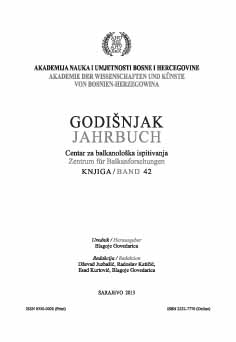Arheološka istraživanja etnogenetskih procesa u prahistoriji zapadnog Balkana: mogućnosti i ograničenja
Archaeological Researches on the Processes of Ethnogenesis in the Western Balkan’s Prehistory: Possibilities and Limitations
Author(s): Adnan KaljanacSubject(s): Archaeology
Published by: Akademija Nauka i Umjetnosti Bosne i Hercegovine
Summary/Abstract: Ethno-genetic studies of prehistoric communities are present from the period of the renaissance antiquarians to the first moments of the modern science formation in the late nineteenth century. During this period in the archaeological research a full range of scientific tools for studying the chronological and typological aspects of material culture developed, and the most important step towards ethno-genetic discourse by forming the concept of archaeological cultures as methodological categories remained present in terms of archaeology is accomplished at the beginning of the XXI century. Archaeological culture is equated with ethnic communities, precisely historical categories. During the second half of the twentieth century in the former Yugoslavia under the influence of German methodological approach, question of the ethno-genetic research has begun its peak from the First Congress of archaeologists Yugoslavia in Niška Banja, and reached the peak of its development within the work of the Centre for Balkan Studies (CBI) of the Academy of Science and Arts of Bosnia and Herzegovina. European archaeology has experienced a similar development and a loss of interest at the end of the twentieth century. By the S. Jones’ work The Archaeology of Ethnicity Constructing identities in the past and present studying ethno-genetic processes in Europe revived again. Within the re-actualization of this issue in the archaeological discourse the question of whether and under what methodological framework or integration with other sciences, opportunities for further development ethno-genetic research in the Western Balkans exists. In that sense, in terms of modern archaeology lays one of the most important issues of the relation between traditional archaeology and its interpretations towards problem of the integration with population’s genetics, as well as the traditional unanswered question of whether one archaeological culture at the same time represents a particular ethnic group.
Journal: Godišnjak Centra za balkanološka ispitivanja
- Issue Year: 2013
- Issue No: 42
- Page Range: 45-69
- Page Count: 25
- Language: Bosnian

